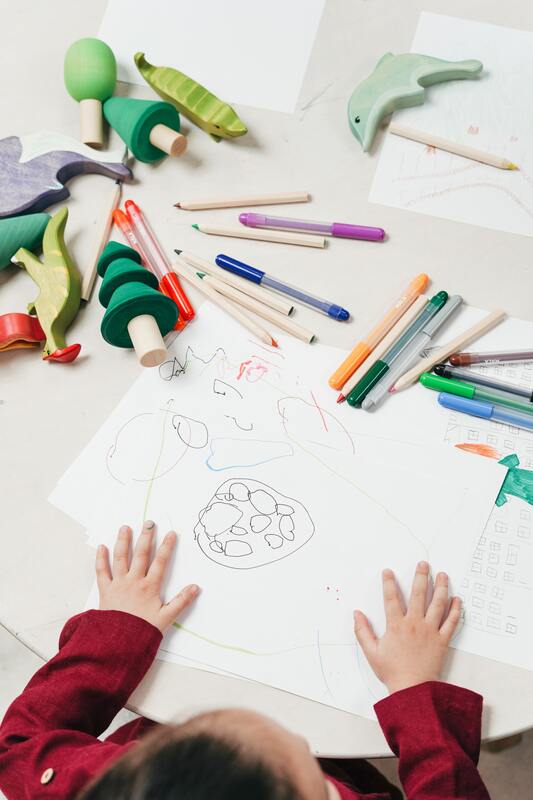How Can Therapy Benefit My Child?
by Louise Ebbrell, Provisional Psychologist - BSc, BSc-Psych (Hons)
November 2020
by Louise Ebbrell, Provisional Psychologist - BSc, BSc-Psych (Hons)
November 2020
In recent years, we have turned an important corner in our attitudes towards mental health. Australia is considered a world leader in campaigns that have focused on increasing awareness of mental health disorders, particularly anxiety and depression. An increasing number of individuals in the public eye are openly discussing their mental health (think Lady Gaga, Dwayne Johnson, Amanda Seyfried just to name a few). Given one in five Australians will experience a mental health disorder in any given year, and almost half of Australians will experience mental ill-health some point in their life, maintaining awareness and an open dialogue is more important than ever before.
But what about mental health in our children? Despite our advances in awareness of mental health, a recent study found that only 35% of Australian parents could confidently recognise signs of mental health problems in their children. Given they are dealing with school stress, bullying, friendship and social adjustments, increasing academic and social expectations, it’s hard to know what is a fleeting problem and what is more serious. So how do you know when to seek help? And can therapy benefit your child
But what about mental health in our children? Despite our advances in awareness of mental health, a recent study found that only 35% of Australian parents could confidently recognise signs of mental health problems in their children. Given they are dealing with school stress, bullying, friendship and social adjustments, increasing academic and social expectations, it’s hard to know what is a fleeting problem and what is more serious. So how do you know when to seek help? And can therapy benefit your child
What does therapy involve?
Therapy is used with children and parents to treat mental health conditions to improve functioning at school, home and in their community. It typically uses talk, play and other activities to help the child understand and express their thoughts and emotions. Therapists can also work together with the child and parent to observe and find other ways to react and express emotions or manage disruptive behaviours.
Signs to look for
Emotional ups and downs are normal for kids. Periods of moodiness, friendship troubles and academic performance are to be expected as kids grow up, and are considered normal developmental challenges. Yet sometimes there is the potential for these to develop into something more serious, so it is important to look out for these signs:
- Extreme changes in daily habits for example eating, sleeping, exercising
- Social withdrawal or changes in behaviour in multiple areas of life - this could include family relationships, school, friendship or community groups and leisure activities
- Engaging in frequent negative behaviour or thought patterns - for example decreasing self-esteem or confidence, expressing hopelessness or making comments like “I wish i weren’t here” or “nobody would care if I ran away”
- Self-harming - This can include repetitive, self-destructive behaviours such as hair pulling or skin picking, talking about or engaging in self harm or talking explicitly about suicide
- Changes in mood or personality - Occasional fluctuations are normal, but if they are severe, consistent and happening over a range of situations (school, home, social life etc), it may be an area of concern
- Showing excessive worry about the future – as children grow up, it is normal to show some signs of worry about the future, for example moving from primary to high school, getting sick or family relationships. But if this is excessive or is affecting your child’s mental health and happiness, seek help.
Situations Where a Therapist Can Help
Major life changes or stressful situations can cause children to be sad, confused, frustrated or angry, so it is understandable that they may act out. In the following situations, a therapist can provide you and your child the skills you both need to cope with big challenges, or simply be someone to talk to who is not their parent or family member.
Even when problems aren’t severe, therapy can help both child and family learn new coping skills and strategies for handling problems. Early intervention yields best results, and so by setting up children with the skills to handle major challenges early in life, they are more likely to be successful in dealing with later challenges. Whether your child needs help handling a stressful situation or dealing with a mental health issue, seeking help in the form of a therapist has the potential to make life easier and more manageable for the whole family.
- Parents getting divorced
- Having a hard time with a new sibling
- Management of a serious, acute, or chronic illness
- Dealing with a deal in the family or a close friend
- Custody evaluations
- Moving homes or changing schools
- Therapy following sexual, physical, or emotional abuse or other traumatic events
- Managing difficult behaviours - e.g. ADHD, ASD, anger management
Even when problems aren’t severe, therapy can help both child and family learn new coping skills and strategies for handling problems. Early intervention yields best results, and so by setting up children with the skills to handle major challenges early in life, they are more likely to be successful in dealing with later challenges. Whether your child needs help handling a stressful situation or dealing with a mental health issue, seeking help in the form of a therapist has the potential to make life easier and more manageable for the whole family.
Sources
https://emergingminds.com.au/resources/child-mental-health-literacy-what-is-it-and-why-is-it-important/
https://www.psychologytoday.com/ca/blog/behavior-problems-behavior-solutions/202009/does-my-child-need-therapy
https://www.verywellfamily.com/signs-your-child-may-need-a-therapist-4130486
https://health.clevelandclinic.org/11-signs-your-child-may-need-a-therapist/
https://www.everydayhealth.com/emotional-health/when-children-need-therapy.aspx
https://emergingminds.com.au/resources/child-mental-health-literacy-what-is-it-and-why-is-it-important/
https://www.psychologytoday.com/ca/blog/behavior-problems-behavior-solutions/202009/does-my-child-need-therapy
https://www.verywellfamily.com/signs-your-child-may-need-a-therapist-4130486
https://health.clevelandclinic.org/11-signs-your-child-may-need-a-therapist/
https://www.everydayhealth.com/emotional-health/when-children-need-therapy.aspx

